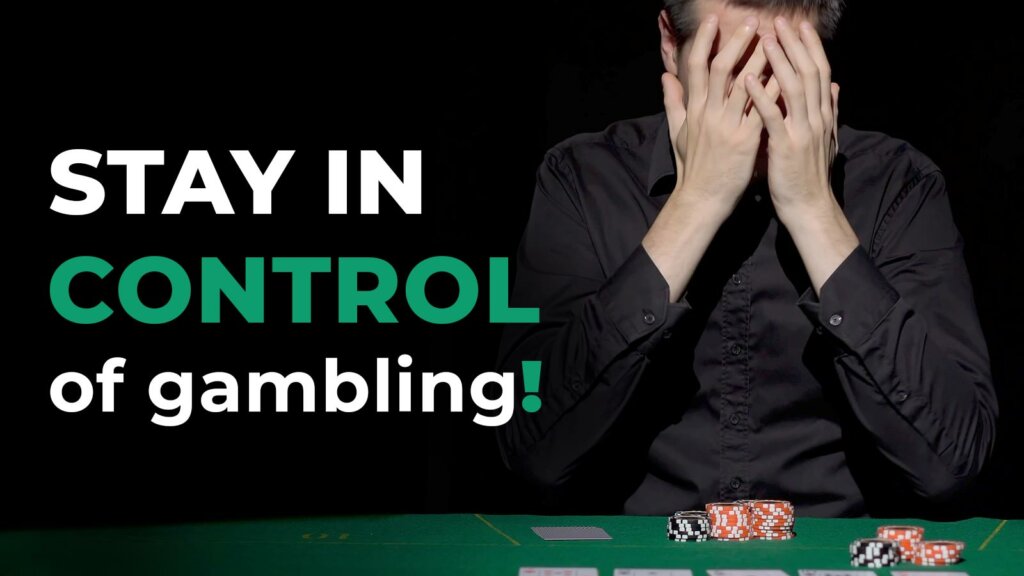
How to Stay in Control of Gambling & Play Responsibly
All the information in this page was checked by:
All the information we present is verified by our team of casino reviewers using multiple sources. We commit to a high level of accuracy and reliability.
We have paid partnerships with the online casino operators featured on our site. We also earn commissions when you, the user, click on certain casino links. These financial partnerships do not affect our reviews, recommendations, or analysis. We remain committed to delivering unbiased gambling reviews. For more details, visit our Advertiser Disclosure page.
Staying in control of your gambling means enjoying the games without letting them take over your life. Dive into our in-depth analysis of problem gambling, uncover expert tips to stay in control, and explore the top UK resources available. Equip yourself with the knowledge and tools to transform gambling from a potential burden back into safe entertainment. Take charge today and safeguard your well-being with insights from CasinoAlpha’s leading experts.
- All You Need to Know About Problem Gambling
- How To Remain In Control: Steps and Tips
- Beyond Gambling
- Helpful Tools & Organisations
- Responsible Gambling Organisations in the UK
- Why Gambling Awareness is Important
- The Responsible Gambler’s Profile
All You Need to Know About Problem Gambling

- The Gambling Commission, the leading regulatory agency for gambling in the UK, defines it to be “gambling to the degree that compromises, disrupts or damages family, personal, or recreational pursuits.“
- The agency also describes a problem gambler as one whose participation in wagering brings negative consequences and a possible loss of control.
Problem gamblers differ from moderate-risk or low-risk players by how much they’re involved in gambling harms and the degree of compulsion. Surveys identified that between 0.5% to 3% of gamblers worldwide are experiencing problem gambling. The UKGC utilises screening tools, including the Problem Gambling Severity Index, to monitor the number of problem British gamblers. The relevant statistical data would, in turn, help with developing new approaches to understanding and combating the issue. There is one more key aspect, however: how does gambling affect the brain of engaged individuals?
The Psychologists’ Outlook

Gambling behaves like a narcotic
Recent discoveries made by addiction specialists show that the gambler’s brain sees casino games as an escape from reality. This discovery directly correlates with dopamine release, the reward chemical triggered by other recreational activities like drinking alcohol, using drugs, or smoking cigarettes.
Cambridge research backs this claim
Dr. Clark, a researcher from Cambridge, used Functional Magnetic Resonance Imaging (fMRI) technology to measure the activities within the reward circuit as gamblers experience near-misses in a roulette game. The research showed that gambling takes effect in the striatum. This brain region is considered the centre of the reward circuit.
His findings are crucial in combatting addiction
It appears that gamblers have distorted perceptions when they near-miss a bet, which causes them to play for longer and improve their chances. The experiment showed that those experiencing near-misses were more likely to chase their losses, which translates into cravings and withdrawal symptoms when further gambling is denied. Nearly 70 years after BF. Skinner wrote his hypothesis that variable rewards create more addictive products; fMRI technology has proved that it is precisely how the brain reacts to gambling stimuli. The near misses, combined with the possibility of making your own choices, promote an illusion of control, which can trick our minds into thinking that we can influence the fixed outcome of casino games.
Things are not all that dark!
Although the reinforcement of compulsive behaviours is embedded into gambling as such, there are approaches to the activity that can alleviate and even nullify harmful aspects.
How To Remain In Control: Steps and Tips

There are three sides to the issue:
- What do you do as a preparation?
- How can you effectively deal with your gambling activity?
- What you will do outside casino premises, be they physical or virtual?
Before Gambling
These steps are prerequisites for gambling in the safest manner.
-
Distinguish between Gambling as Entertainment and as a Source of Income
While professional British gamblers make a living from the casino, it does not necessarily mean that the average UK player should continuously pursue this career. In 2020, 7% of participants identified gambling as a method of earning their day-to-day funds.
For the overwhelming majority, gambling will and should remain a form of entertainment.
As the UKGC also suggests, carefully discern your motivations for betting on casino games. If you practice it to escape debt, obtain quick profit, or as a daily occupation, rethink your participation altogether.
-
Keep Track of the Time and Money you Spend

How to do that?
If your service does not provide histories for gambling activities and transactions, you should keep tabs on yourself. This is as simple as writing a diary. It is better that you only use one service, as multiple accounts will hinder your efforts to keep track of your activities.
-
Set a Money Limit Before You Start Gambling
If you are planning to start gambling, you need to set a limit in advance. This small trick will help you manage your risks better and not overspend if luck is not on your side.
How can you better act?
You should establish a clear threshold for how much money you wish to sink into gambling. You must consider all these funds as expendable.
While Gambling
We will provide some concrete tips for the best gambling etiquette.
-
Never Bet More Than You Can Afford!

How do you approach the issue?
Establish clear loss limits and stick by them. These should be monthly, weekly, or even daily. Once you have reached these amounts, take a break.
-
Ideally, you want to Bet at Most 1% of your Total Bankroll at Once
So, you have set a proper bankroll for gambling. Let us say that you have set aside a £500 casino budget. In that case, your bets should not exceed £5. The case where you have accrued additional funds should not be seen as an exception. In general, do not modify your betting limits on the go or during gambling.
-
Avoid Chasing Your Losses!

How should you act instead?
We stress that you should respect your spending and loss limits without exception. When you are on a losing streak, interrupt your gambling. You could develop a cohesive betting strategy for certain games that will reduce hasty decisions.
Know myths from facts!
More than its psychological implications, expecting to win after a series of losses is typical of the gambler’s fallacy. As most casino games have completely randomised rounds, no number of losses will raise your chances of an eventual win.
-
Always Bet from a Position of Knowledge
Before you start wagering, make sure you have a deep understanding of how the game works. This rule applies primarily to skill games, such as Poker, Blackjack, and sports betting, but the idea is simple. You will be less likely to waste your money when you bet wisely. How you may act in this case will depend on the partially skill-based game you choose. Listen to the CasinoAlpah advice and study both the game in general and your modus operandi in particular.
-
Do not Gamble when Feeling Down
If you feel depressed or angry, avoid gambling with no exception. Negative feelings can impact your ability to make efficient decisions.
Being impulsive may, in turn, become compulsive
As the general rule for all gambling advice goes, take all decisions while being clearheaded.
-
Never Wager while Under the Influence of Substances
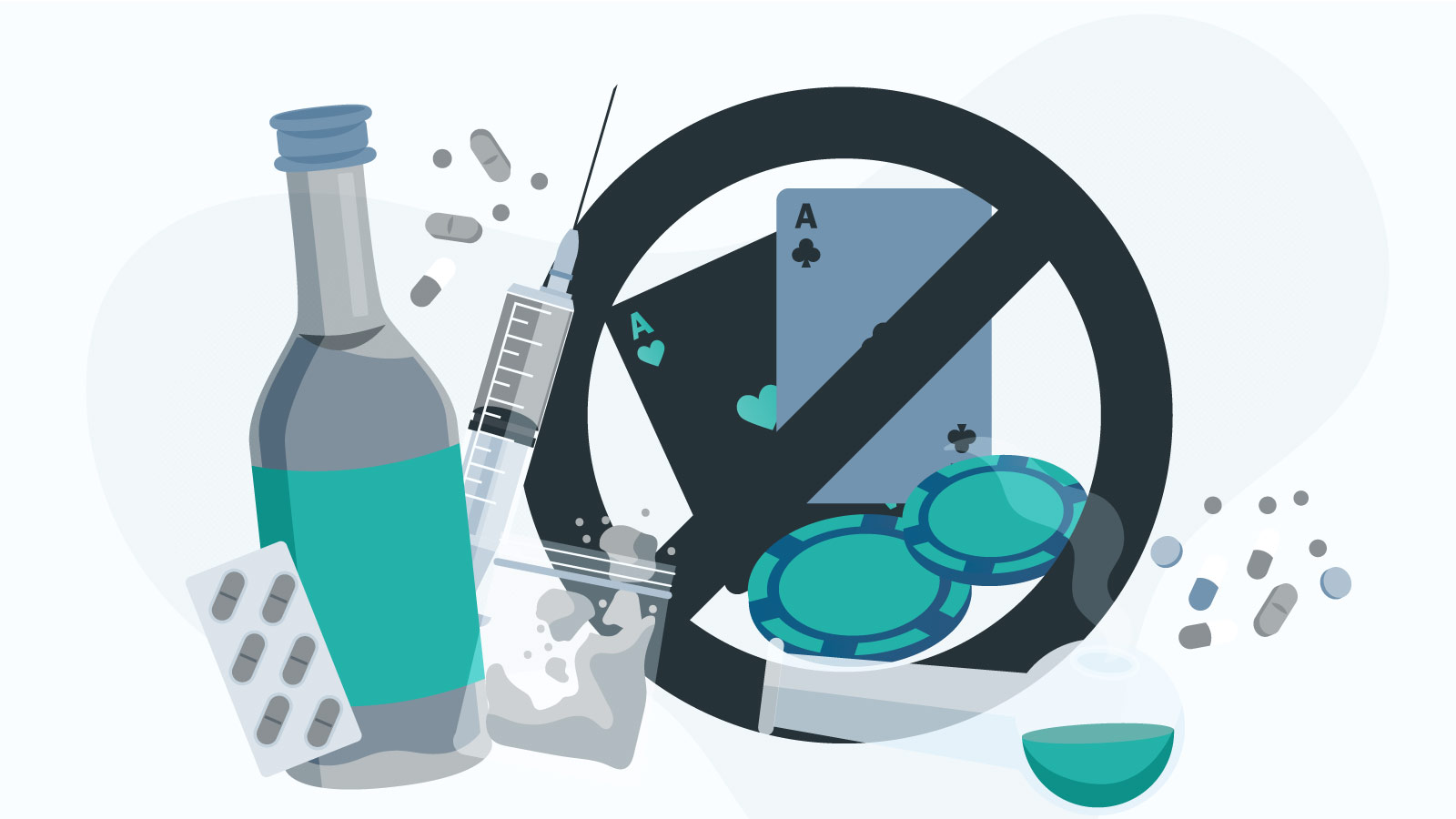
Beyond Gambling
Although not so apparently tied to gambling, the following series of advice will inform our British readers regarding daily decisions in a gambler’s life that will make a difference.
-
Do not let Gambling Interfere with your Responsibilities
Skipping work to gamble is dangerous behaviour. Although it may seem unlikely, around 15% of British gamblers have been gambling online in their workplace only last year.
What to do instead?
- Avoid letting your gambling activities interfere with your family life or career.
- Administer your gambling time such that you have the time to maintain healthy relationships.
Most often, a gambler’s social circle will be a strong facilitator for surpassing addictive behaviours.
-
Diversify your Hobbies and Interests beyond Gambling
If your only source of satisfaction is playing at a casino, you should balance this out by pursuing other hobbies unrelated to gambling. Think of other things you enjoy or even explore other activities to stop gambling. You do not necessarily have to replace gambling altogether but rather not have it as your sole relaxation mode.
-
Take Regular Breaks from the Casino
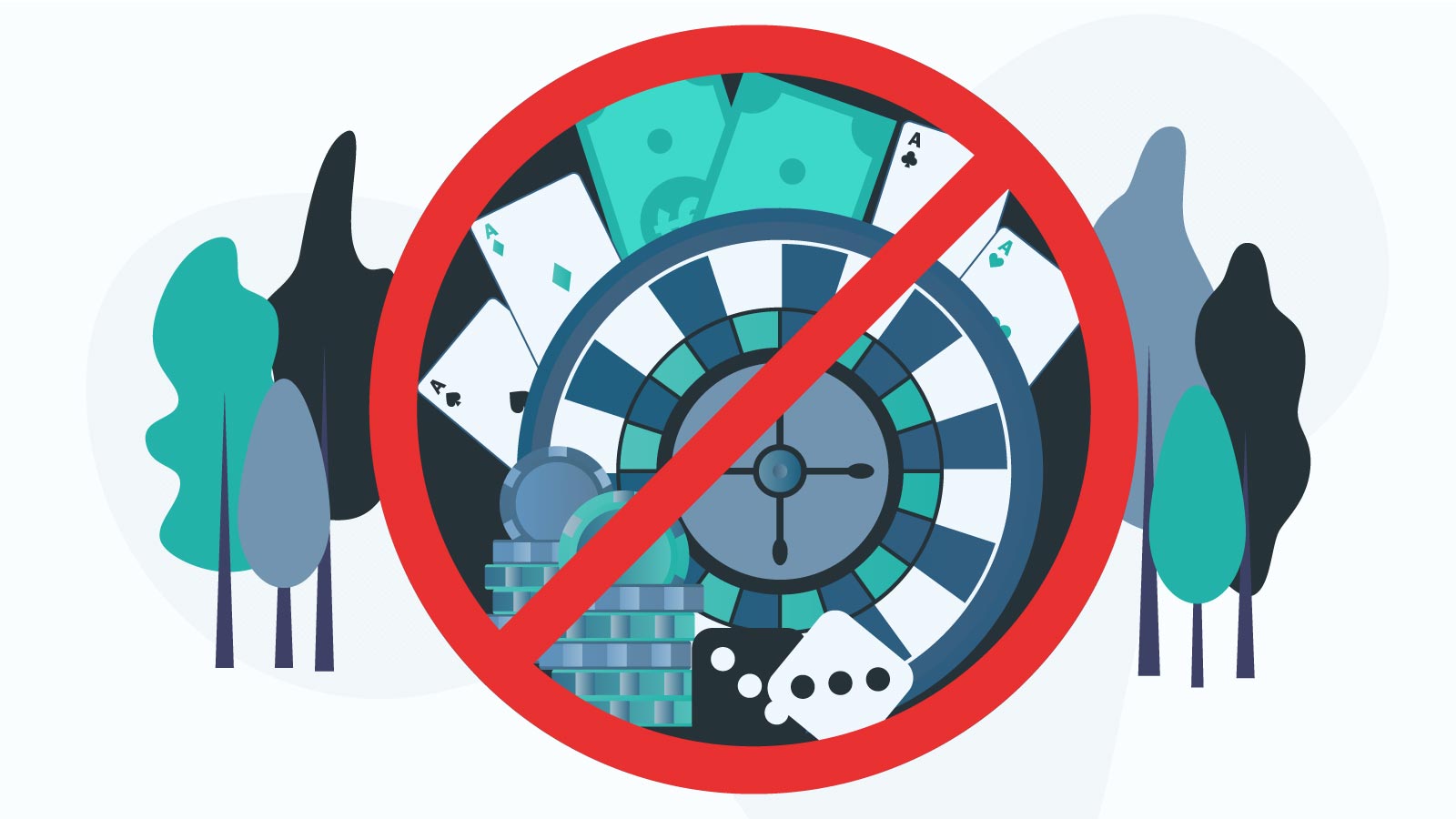
An occasional break is more than beneficial
Playing at the casino continuously could result in a loss of perspective! Previous advice regarding loss, spending, and time limits will help you realise when it is best to take a breather and reassess your gambling.
-
Use all available Tools for Prevention, and Seek Help if Needed
You do not need to bear the brunt of responsible gambling on your own. Most online betting gambling businesses will provide tools for combating addictive behaviours. Numerous organisations have been specially set up to help British gamblers with compulsive issues. Our next section is dedicated to selecting the most effective responsible gambling features and organisations the UK player can access.
-
Bonus Tip: Pick Legitimate and High-Quality Casinos
Finding a safe and sound casino may take a while, but it is worthwhile. And you do not have to scour by yourself, as our best online casinos UK listings will provide legal and respectable services and all the data regarding the platform at large and their responsible gambling measures.
Helpful Tools & Organisations

| Responsible Gambling Tool | Financial Control | Time Allocation | Social Responsibility |
|---|---|---|---|
| Game Time Reminder | x | ✓ | x |
| Cooling-Off Limit | ✓ | ✓ | N/A |
| Game History | ✓ | ✓ | x |
| Time-Out Options | N/A | ✓ | ✓ |
| Financial Limits | ✓ | x | x |
| Auto-Play Limits | ✓ | ✓ | x |
| Self-Exclusion | ✓ | ✓ | ✓ |
| Account Closure | ✓ | ✓ | ✓ |
| Loss Limits | ✓ | x | x |
| Self-Assessment Tests | x | x | ✓ |
| Session Limits | x | ✓ | N/A |
| Minor Gambling Preventive Tools | x | x | ✓ |
| Responsible Gambling Advice | N/A | x | ✓ |
| Budget Calendar | ✓ | N/A | x |
| Reverse Withdrawal Settings | ✓ | x | N/A |
| Trained Customer Support | x | x | ✓ |
| Reality Check | N/A | ✓ | x |
*Table caption: The check and not marks indicate whether the tool is suited for a specific responsible gambling concern. However, blank space means that the feature may also provide some aid in an area with some specifications.
Key Aspects of Responsible Gambling Tools:
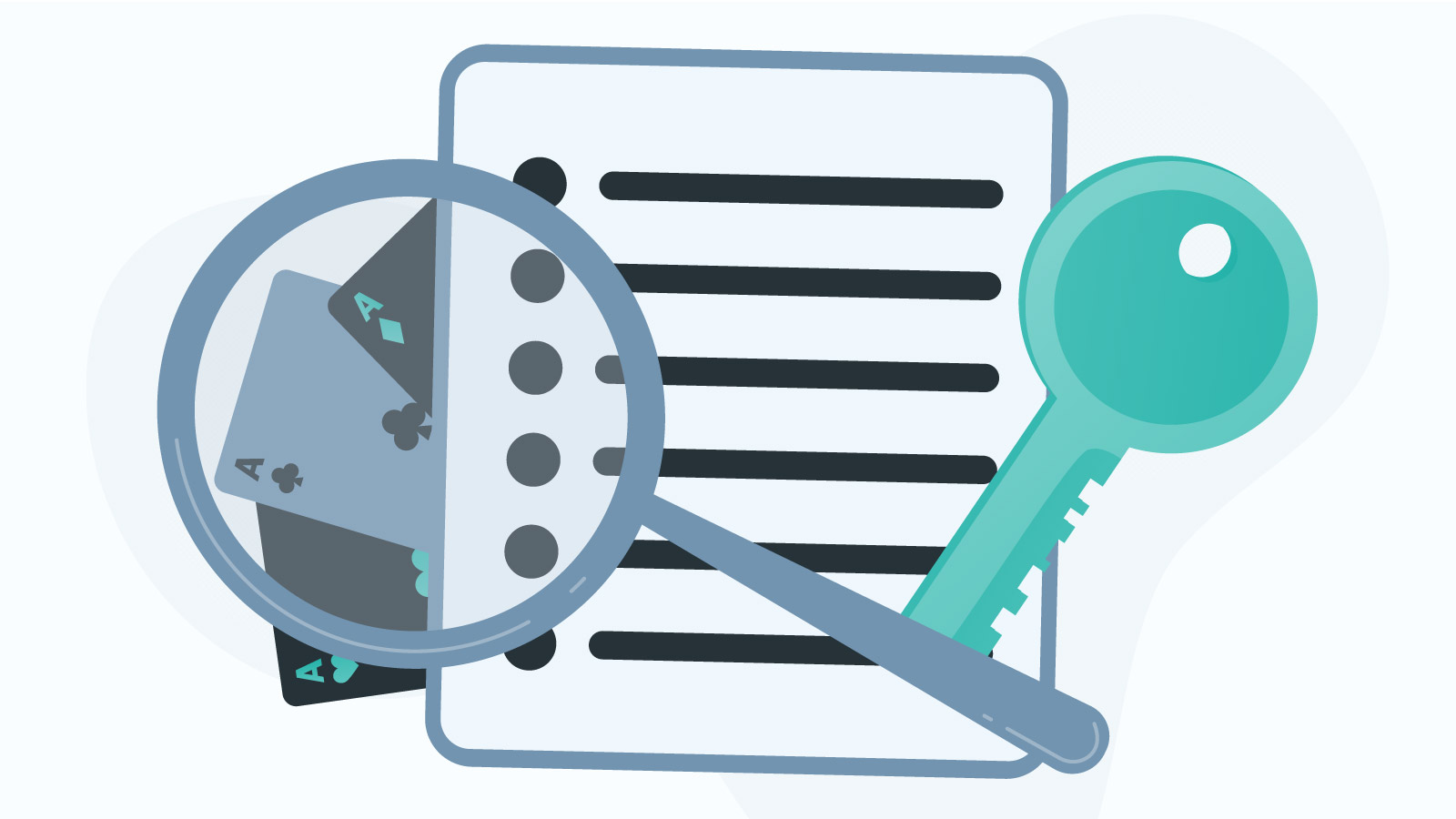
- The Game Time Reminder will only inform you of elapsed time within one game.
- Cooling-Off implies a shorter period than Self-Exclusion and is also less drastic.
- Closing an account will exclude you from one platform.
- Self-Exclusion may affect your activity on other sites.
- Problem gamblers may cancel withdrawals to continue their wagering.
- Minor preventive tools are part of the wider casino KYC procedure.
- The best gambling sites will have expert-trained customer service agents.
One extra but nonetheless necessary element every casino must feature is a series of links to responsible gambling agencies. These are either national or international bodies aiding British gamblers with harmful gambling behaviours.
Responsible Gambling Organisations in the UK

| The Organisation | Advice & Expert Support | Self-Exclusion & Blocks | Therapy & Treatment |
|---|---|---|---|
| Gamstop | x | ✓ | x |
| GamCare | ✓ | x | x |
| BeGambleAware.org | ✓ | x | x |
| Gamban | x | ✓ | x |
| Gordon Moody Association | ✓ | x | ✓ |
| CNWL Problem Gambling Clinic | ✓ | x | ✓ |
| Gamblers Anonymous UK | ✓ | x | ✓ |
| Gam-Anon | ✓ | x | x |
| Gamblock | ✓ | ✓ | x |
| The Christian Centre for Gambling Rehabilitation | ✓ | x | ✓ |
| Count Me Out | ✓ | x | x |
All UKGC licensed online casinos must abide by Gamstop’s self-exclusion measures. Using the service will ensure that British applicants will be kept away from gambling. There are many more reasons to use the service when in need, which we expand on in our guide to Gamstop.
These organisations specialise in one field: helping British gamblers stay in control
This does not mean that UK registrants should resort to only one of these services. The efforts of these organisations are complementary. This fact is only confirmed by a partnership for the TalkBanStop campaign :
- GamCare
- Gamban
- Gamstop’s
Remember:
- British gamblers should use all means provided to stay in control of their activities!
- Gam-Anon is mainly aimed at relatives, partners, or close friends affected by another person’s gambling. The service provides additional social support unencountered in other cases.
Why Gambling Awareness is Important
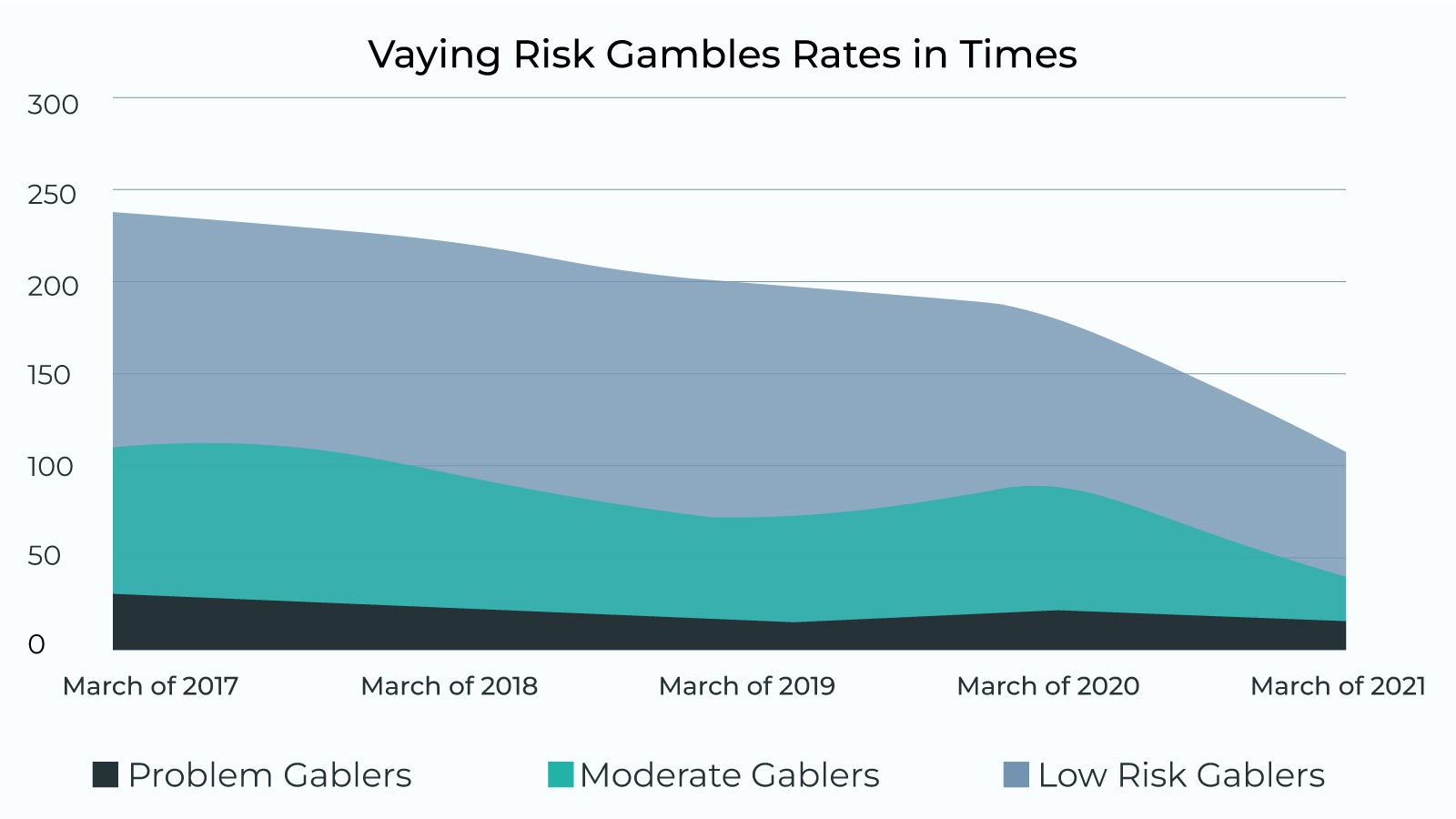
The problem with dry statistics
- These numbers do not consider the effects problem gambling has on an individual’s friends and relatives.
- They dismiss the impact the activity might have on low or moderate risk gamblers.
The past year saw the yearly estimated expenditure of gambling addiction in the UK rise to between £260 million to £1.2 billion.
Data regarding the issue’s evolution in time
We observe that the general trend indicates the amelioration of gambling-related issues with the advent of comprehensive and cohesive responsibility measures. With self-exclusion, for instance, in the past, applicants cited difficulties in registration and a lack of a market-wide opt-out agency.
Why is this important?
In order to assess the relevancy of emerging tools and organisations, we do deep research, thus helping British gamblers stay in control. We cannot consider the rates falling following March 2020, as it coincided with Gamstop becoming mandatory for UKGC licensed online casinos.
Solutions to problem gambling issues also reduce the numbers of both low-risk and medium-risk players
Gendered social differences also play a part in gamblers’ efforts to stay in control. Males still represent the majority of problem players. 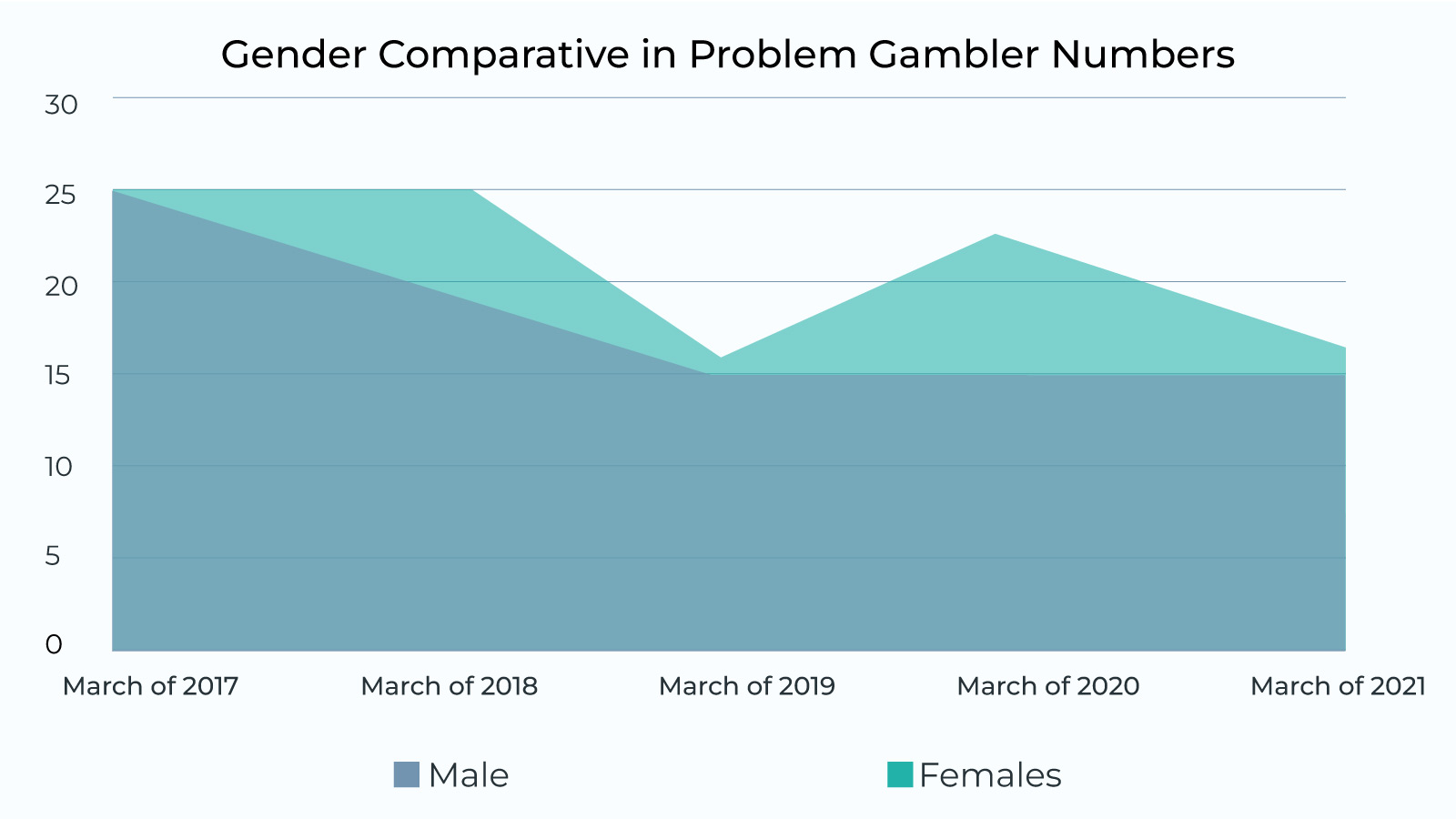
Risk gambling occurrences greatly vary across age groups
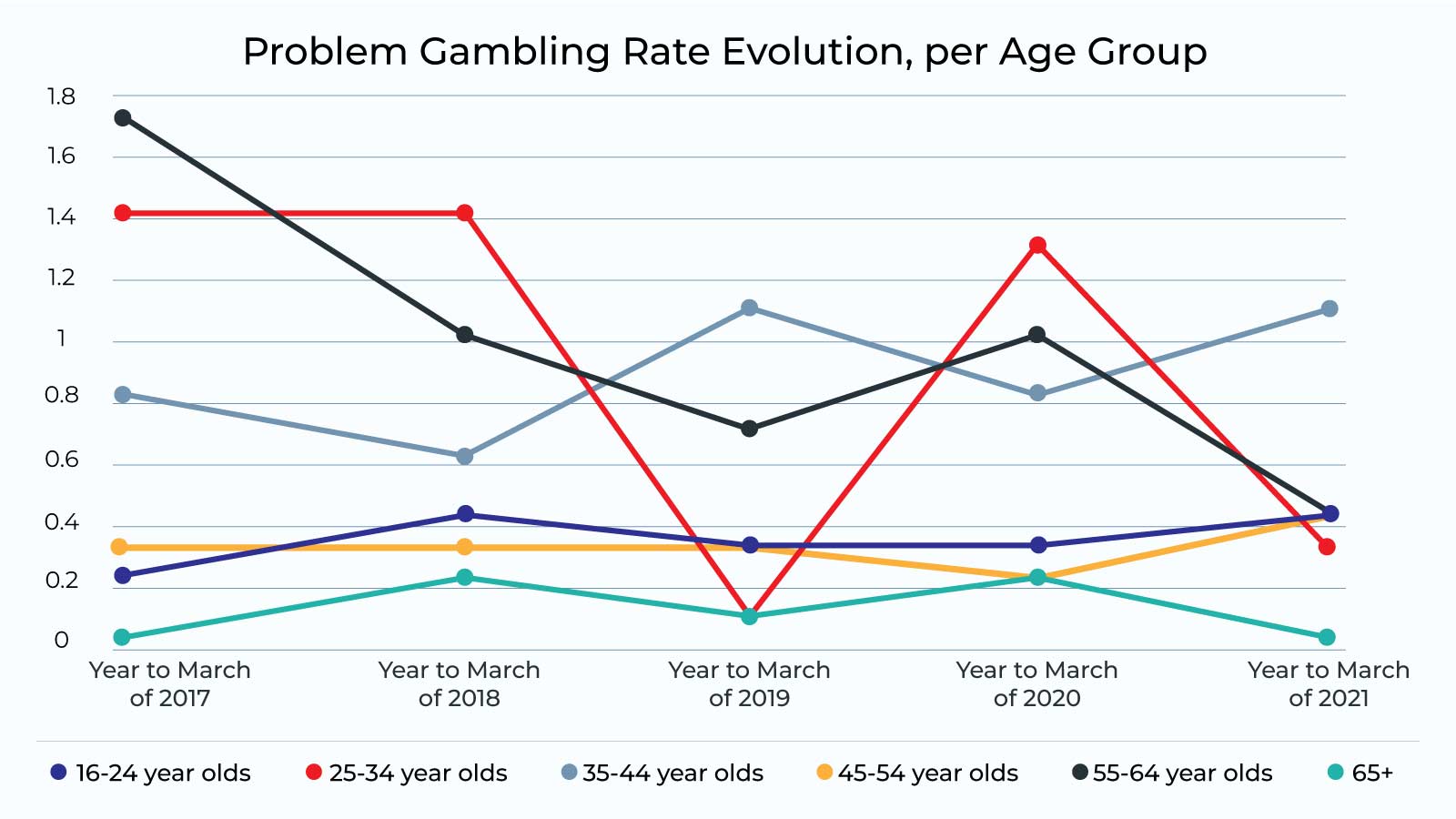
The previous year’s data
In March 2017, the 16-to-24-year age group was the one most affected by gambling addiction. Subsequent bettering of KYC procedures, gaming tools, and disseminating information thus produced the possibility of underage and young gamblers staying in control.
Gambling addiction was more complex than most expected
Following thorough statistical analyses, leading regulatory bodies, such as the UKGC, and the Advisory Board for Safe Gambling, implemented a series of responsibility-related measures. They effectively addressed psychological, gendered, and age-related considerations. There’s hope for the future With the falling numbers of unaddressed problem gamblers and soaring numbers among players willing to take steps to stay in control, we can already see results. Twitch joined the cause of combating gambling addiction Starting with September 2022, the streaming platform introduced the Twitch gambling ban, which restricted the activity of online casino streamers to promote specific promotional types of content.
The Responsible Gambler’s Profile
Our experts have underlined several issues that may cause problem gambling. They also came with a series of concrete tips and advice so that British players can stay in control during their betting.
This is how a responsible UK player will keep gambling in check:
- The model player will understand that gambling is just a form of entertainment and will have established clear loss, time, spending, and deposit limits.
- Additionally, he or she would be familiar with the rules and technical considerations, such as the RTP value, for each game engaged in.
- A responsible player will gamble only when emotionally stable and clearheaded and will only use expendable funds. The bets would not exceed 1%, with no exception. When on a losing streak, responsible players will stop and reassess their gambling with the help of their activity diary.
- The responsible gambler will take breaks from wagering. His or her life will be diverse enough to have other hobbies and occupations, as well as a close-knit circle of friends and relatives for support.
- His or her physical or online gambling would never interfere with professional or social responsibilities. The model player should understand the underlying multi-faceted issue he or she might face and that we have underlined.
- Finally, the responsible gambler will use available tools to their fullest extent and, when in need, will request the assistance of agencies accredited in the UK.

